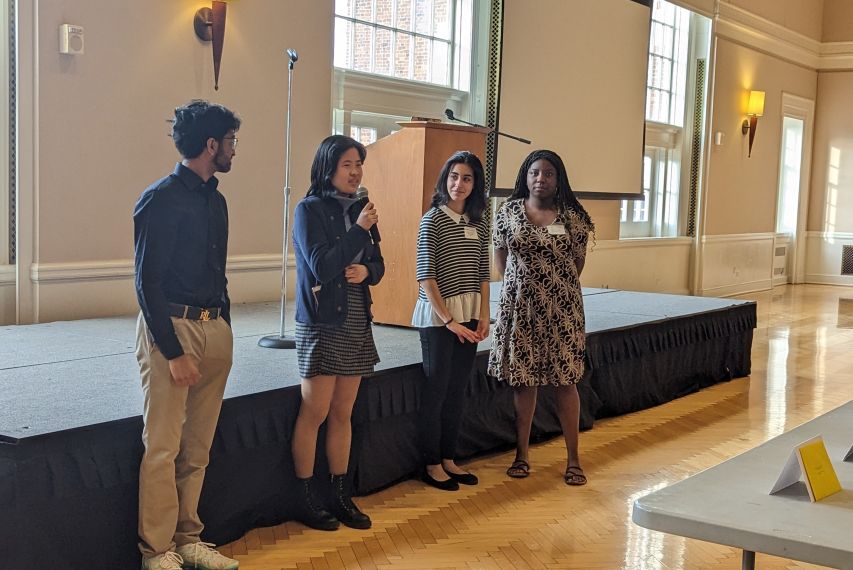The room was brimming with students from across Grounds at the University of Virginia ready to present their global public health cases to address Tuberculosis in Tanzania. Even though the temperatures outside hovered in the low 30s, inside, anticipation ran high. The students were participating in the 10th anniversary of the Global Health Case Competition (GHCC) hosted by the Center for Global Health Equity.
UVA is among a small group of institutions that writes a new global health case and students compete annually. Modeled on the Emory University Morningside Global Health Case Competition, interdisciplinary teams from across Grounds participate in this challenge where global partners advise and edit an original case each year, with the help of the CGHE Student Advisory Board.
“The students' energy, their endless capacity for addressing challenges, their ability to collaborate across multiple barriers, and their enthusiasm for engaging with global partners and global issues is remarkable,” said April Ballard, associate director of CGHE. “Their work during this event is the manifestation of both the good and the great.”
For this year, CGHE collaborated with Stellah Mpagama and Bibie Said from Kibong’oto Infectious Diseases Hospital in Tanzania and Scott Heysell from UVA Health, to develop the case which addressed the intersection between malnutrition and tuberculosis. Tanzania is one of the top 30 countries with the highest rates of tuberculosis.
The partners worked with student leaders on the CGHE Student Advisory Board to develop the case. The problem for this year competition was titled “Fight for equitable prevention and treatment of Tuberculosis in Tanzania”
One of the judges for the competition was Pranay Sinha, Assistant Professor of Infectious Diseases at Boston University, who described this moment as a “full circle” as he was a key member who laid the foundation for the case competition at UVA.
Hoos Tackle Global Health Challenges in CGHE's Case Competition
Hoos Tackle Global Health Challenges in CGHE's Case Competition

A decade ago, as a student at UVA, he signed up for the Emory case competition. Sinha was teamed up with a nurse, an engineering student, a commerce student, an education student, and an anthropology major on a challenging case study of post-civil war Sri Lanka dealing with a plethora of health and equity issues with inadequate funding.
“I realized that UVA needed an internal competition to prepare us better,” Sinha said. “But more importantly, global health case competitions lay bare the need for a plurality of thought and perspectives to handle thorny, cross-cutting problems that are not amenable to simple biomedical approaches.”
Teaming up with Colleen Laurence, an UVA alum, who was returning to CVille to go to Medical School, Rebecca Dillingham and April Ballard at the Center for Global Health Equity along with other student leaders on campus, Sinha helped establish the first UVA case competition.
This competition has run successfully for the past decade driven mainly by student participation and interest. This year, thirty two student teams registered to compete in GHCC. For the winner, the judges considered how well the teams understood the problem, how practical and acceptable their recommended interventions were, how well they delivered their presentation and how effectively they answered questions during the Q&A session.
The winner for this year’s case competition was Team #21. It included Briana Corrielus, a 3rd year student majoring in cognitive science and youth and social innovation at UVA School of Education and Human Development; Mackenzie Chen, a 1st Year Human Biology major at College of Arts and Sciences; Yash Patel, a 3rd Year Biology major at College of Arts and Sciences; and Nina Jannatifar, a 4th Year Chemistry major in the College of Arts and Sciences.
Speaking about the competition, Patel said that one of the factors that helped them was having lived through the COVID-19 pandemic. “Observing how different dimensions in life can be unrooted by this infectious disease gave us a unique lens to approach this issue.” While another team member credited the opportunity to interacting with guest judges from Tanzania. “When developing ideas for public health initiatives, it’s imperative to understand the local context and prioritize the needs of the community,” said Chen. “Hearing our guest judges share their experiences and views helped us gain a better understanding of what the community actually needs, rather than what we think it needs.”
Sinha reflects that the competition has changed how he approaches his work and also has introduced him to his best friend Colleen Laurence. “It imbued me with a natural instinct to reach across disciplines which has informed my work today,” he said adding that TB has been described as a social disease with a medical aspect. “I work with nurses, nutritionists, social workers, economists, data scientists, and basic scientists to understand the impact of undernutrition on TB in India which is closely related to the topic of the first UVA case competition.”
Students who have participated in the competition share Sinha’s enthusiasm for the competition. “I am extremely grateful for the opportunity to collaborate across disciplines and have crucial dialogue on a pressing matter and help develop ideas that could have a real-world impact,” Jannatifar said.



